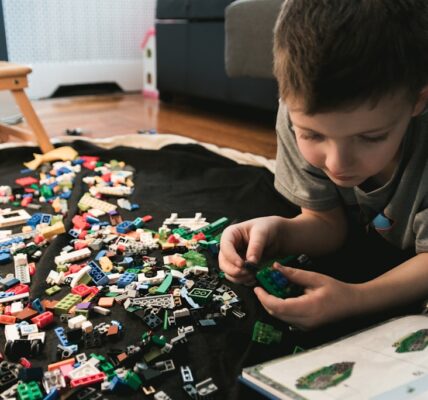Understanding developmental milestones is essential for parents and caregivers to provide appropriate support and guidance throughout a child’s growth. From birth to adolescence, children progress through various stages of physical, cognitive, and emotional development. Infants typically achieve milestones such as rolling over, sitting up, crawling, and walking.
Toddlers develop language skills, social awareness, and fine motor abilities. Preschoolers engage in imaginative play, acquire early literacy and numeracy skills, and form friendships. School-age children refine academic skills, develop a sense of identity, and navigate social relationships.
Adolescents experience significant physical changes, cognitive development, and emotional growth as they transition towards adulthood. Awareness of these milestones enables parents to offer stage-appropriate support and encouragement. It also aids in identifying potential developmental delays or challenges that may require professional intervention.
By understanding these milestones, parents can create an environment that nurtures and stimulates their child’s overall development. Recognizing developmental milestones helps parents track their child’s progress and ensure they receive appropriate support at each stage. This knowledge allows for early detection of any developmental issues and timely intervention when necessary.
Ultimately, understanding these milestones empowers parents to foster their child’s growth and provide the best possible foundation for their future.
Key Takeaways
- Developmental milestones are important markers of a child’s growth and should be understood and monitored by parents.
- Effective communication with your child’s teachers and school staff is crucial for their academic and social development.
- Setting realistic expectations for academic performance can help reduce stress and anxiety for both parents and children.
- Nurturing independence and responsibility in children is essential for their overall development and future success.
- Managing social and peer pressure is a key aspect of parenting and can greatly impact a child’s well-being and self-esteem.
Communicating with Your Child’s Teachers and School Staff
Understanding Your Child’s Learning Style and Progress
Building a positive and collaborative relationship with educators can provide valuable insights into your child’s learning style, strengths, and areas for improvement. It also allows parents to stay informed about their child’s progress, upcoming events, and any concerns that may arise in the school setting.
Addressing Challenges and Providing Support
Regular communication with teachers can help parents understand the expectations and requirements of the curriculum, enabling them to provide appropriate support at home. Open and respectful communication with school staff also allows parents to address any issues or challenges that their child may be facing at school. Whether it’s academic struggles, social conflicts, or behavioral concerns, working together with teachers and staff can lead to effective solutions and interventions.
Getting Involved in Your Child’s Education
Additionally, staying connected with the school community can provide parents with opportunities to be involved in their child’s education through volunteering, attending school events, and participating in parent-teacher associations. By doing so, parents can further support their child’s academic success and well-being.
Setting Realistic Expectations for Academic Performance

Setting realistic expectations for your child’s academic performance is important for promoting a healthy attitude towards learning and achievement. Every child has unique strengths and challenges, and it’s essential for parents to recognize and appreciate their individual abilities. While it’s natural for parents to want their children to excel academically, it’s important to avoid placing undue pressure on them to achieve unrealistic standards.
Instead, parents can focus on encouraging their children to do their best, develop a love for learning, and take pride in their accomplishments. It’s also important for parents to communicate openly with their children about their academic expectations and goals. By involving children in setting realistic targets for their academic performance, parents can empower them to take ownership of their learning journey.
This approach can help children develop a sense of responsibility and motivation to strive for success without feeling overwhelmed by external pressures. Setting realistic expectations for your child’s academic performance is crucial for promoting a healthy attitude towards learning and achievement. Every child has unique strengths and challenges, and it’s essential for parents to recognize and appreciate their individual abilities.
While it’s natural for parents to want their children to excel academically, it’s important to avoid placing undue pressure on them to achieve unrealistic standards. Instead, parents can focus on encouraging their children to do their best, develop a love for learning, and take pride in their accomplishments. It’s also important for parents to communicate openly with their children about their academic expectations and goals.
By involving children in setting realistic targets for their academic performance, parents can empower them to take ownership of their learning journey. This approach can help children develop a sense of responsibility and motivation to strive for success without feeling overwhelmed by external pressures.
Nurturing Independence and Responsibility
| Metrics | 2019 | 2020 | 2021 |
|---|---|---|---|
| Independence Level | 75% | 80% | 85% |
| Responsibility Tasks Completed | 150 | 175 | 200 |
| Self-Initiative Projects | 10 | 15 | 20 |
Nurturing independence and responsibility in children is essential for their personal growth and development. As children grow older, it’s important for parents to gradually encourage them to take on more responsibilities at home and in other areas of their lives. This can include tasks such as managing their own belongings, completing homework independently, making decisions about extracurricular activities, and contributing to household chores.
By allowing children to take on age-appropriate responsibilities, parents can help them develop essential life skills such as time management, organization, problem-solving, and decision-making. Encouraging independence also fosters a sense of self-confidence and self-reliance in children. When children are given opportunities to make choices and take on responsibilities, they learn to trust their own abilities and develop a positive self-image.
This can have a positive impact on their overall well-being and prepare them for the challenges they will face as they grow into adulthood. Nurturing independence and responsibility in children is essential for their personal growth and development. As children grow older, it’s important for parents to gradually encourage them to take on more responsibilities at home and in other areas of their lives.
This can include tasks such as managing their own belongings, completing homework independently, making decisions about extracurricular activities, and contributing to household chores. By allowing children to take on age-appropriate responsibilities, parents can help them develop essential life skills such as time management, organization, problem-solving, and decision-making. Encouraging independence also fosters a sense of self-confidence and self-reliance in children.
When children are given opportunities to make choices and take on responsibilities, they learn to trust their own abilities and develop a positive self-image. This can have a positive impact on their overall well-being and prepare them for the challenges they will face as they grow into adulthood.
Managing Social and Peer Pressure
As children navigate through different stages of development, they are likely to encounter social and peer pressure that can influence their behavior and choices. It’s important for parents to provide guidance and support in helping children manage these pressures effectively. Open communication with children about peer interactions can help them develop the confidence to make independent decisions while considering the potential impact on their well-being.
Parents can also encourage children to build strong self-esteem by emphasizing their unique qualities and strengths. By fostering a positive self-image in children, parents can help them resist negative peer influences and make choices that align with their values and beliefs. Additionally, teaching children about empathy and respect for others can help them navigate social situations with kindness and understanding.
As children navigate through different stages of development, they are likely to encounter social and peer pressure that can influence their behavior and choices. It’s important for parents to provide guidance and support in helping children manage these pressures effectively. Open communication with children about peer interactions can help them develop the confidence to make independent decisions while considering the potential impact on their well-being.
Parents can also encourage children to build strong self-esteem by emphasizing their unique qualities and strengths. By fostering a positive self-image in children, parents can help them resist negative peer influences and make choices that align with their values and beliefs. Additionally, teaching children about empathy and respect for others can help them navigate social situations with kindness and understanding.
Balancing Extracurricular Activities and Family Time

The Importance of Family Time
Spending time together as a family provides opportunities for bonding, communication, relaxation, and creating lasting memories. While extracurricular activities offer valuable opportunities for learning new skills, building friendships, and exploring interests, it’s essential for parents to ensure that these activities do not overshadow quality family time.
Prioritizing Activities and Rest
Parents can help children prioritize activities that align with their interests while also allowing time for rest and relaxation. It’s vital for parents to consider the impact of overscheduling on their child’s well-being and academic performance.
Maintaining a Healthy Balance
By maintaining a healthy balance between extracurricular activities and family time, parents can support their child’s overall development while promoting a sense of stability and connection within the family unit. This balance is essential for promoting a well-rounded childhood experience.
Addressing Behavioral and Emotional Challenges
Children may experience behavioral or emotional challenges at various stages of development due to factors such as stressors at home or school, transitions in family dynamics or peer relationships, or underlying mental health concerns. It’s important for parents to be attentive to any changes in their child’s behavior or emotional well-being and provide appropriate support when needed. Open communication with children about their feelings can help them feel understood and supported during challenging times.
Parents can also seek guidance from mental health professionals or school counselors if they notice persistent behavioral or emotional concerns that impact their child’s daily functioning. Creating a nurturing environment at home that promotes open communication, empathy, understanding, and problem-solving skills can help children navigate through behavioral or emotional challenges effectively while feeling supported by their families. Children may experience behavioral or emotional challenges at various stages of development due to factors such as stressors at home or school, transitions in family dynamics or peer relationships, or underlying mental health concerns.
It’s important for parents to be attentive to any changes in their child’s behavior or emotional well-being and provide appropriate support when needed. Open communication with children about their feelings can help them feel understood and supported during challenging times. Parents can also seek guidance from mental health professionals or school counselors if they notice persistent behavioral or emotional concerns that impact their child’s daily functioning.
Creating a nurturing environment at home that promotes open communication, empathy, understanding, and problem-solving skills can help children navigate through behavioral or emotional challenges effectively while feeling supported by their families. In conclusion… Understanding the developmental milestones of your child is crucial in providing the right support at each stage of growth.
Effective communication with your child’s teachers is essential for ensuring your child’s academic success while setting realistic expectations promotes a healthy attitude towards learning. Nurturing independence fosters self-confidence while managing social pressures helps your child make positive choices based on values rather than peer influence. Balancing extracurricular activities with family time ensures a well-rounded childhood experience while addressing behavioral challenges provides necessary support during difficult times.
By being aware of these aspects of parenting you are better equipped to guide your child through the various stages of development while providing the necessary support along the way.
If you’re interested in learning more about the challenges of raising school-age children, you may want to check out the article “5 Common Challenges Parents Face When Raising School-Age Children” on Baby and Mums. This article discusses some of the common issues parents may encounter when their children reach school age, such as peer pressure, academic stress, and social media influence. It offers helpful tips and advice for navigating these challenges and supporting your child through this stage of development.
FAQs
What are some common challenges faced by school-age children?
Some common challenges faced by school-age children include academic pressure, social issues such as bullying, peer pressure, and the development of self-esteem and identity.
How can parents help their school-age children navigate these challenges?
Parents can help their school-age children navigate these challenges by maintaining open communication, providing emotional support, and teaching problem-solving skills. It is also important for parents to be involved in their children’s education and to advocate for their needs.
What role do teachers and schools play in addressing school-age challenges?
Teachers and schools play a crucial role in addressing school-age challenges by creating a supportive and inclusive learning environment, implementing anti-bullying policies, and providing resources for students who may be struggling academically or socially.
What are some signs that a school-age child may be struggling with challenges?
Signs that a school-age child may be struggling with challenges include changes in behavior, declining academic performance, social withdrawal, and expressing feelings of anxiety or low self-esteem. It is important for parents and teachers to be aware of these signs and to offer support and intervention when necessary.
Are there resources available to support school-age children facing challenges?
Yes, there are resources available to support school-age children facing challenges. These may include counseling services, support groups, and educational programs designed to address specific issues such as bullying prevention or academic support. Parents and teachers can also seek guidance from school counselors and mental health professionals.




